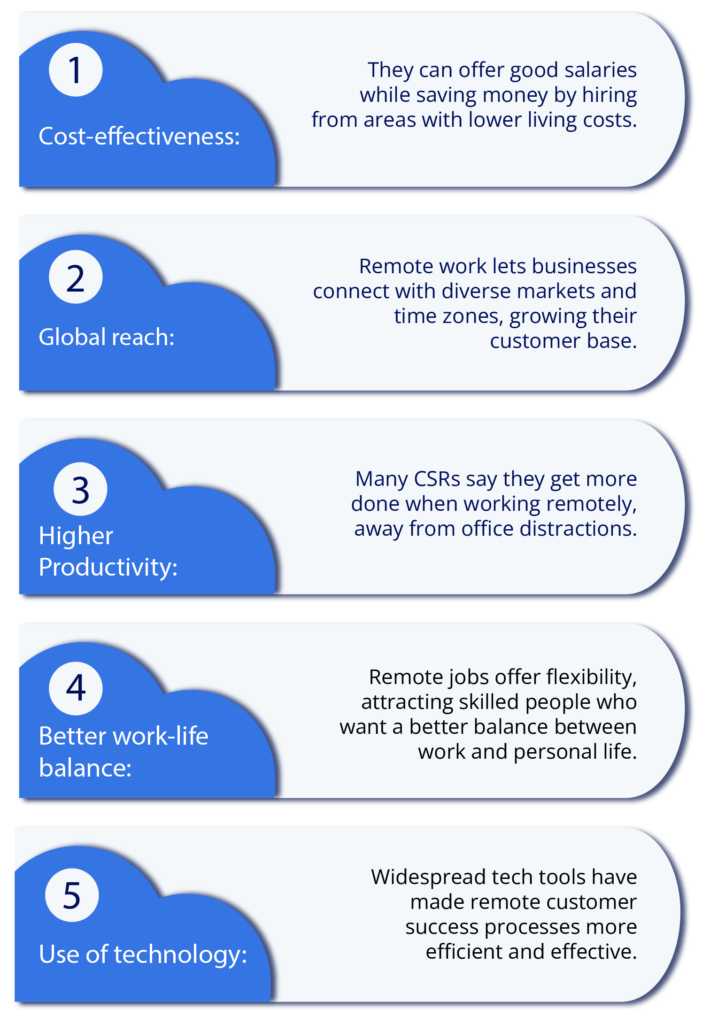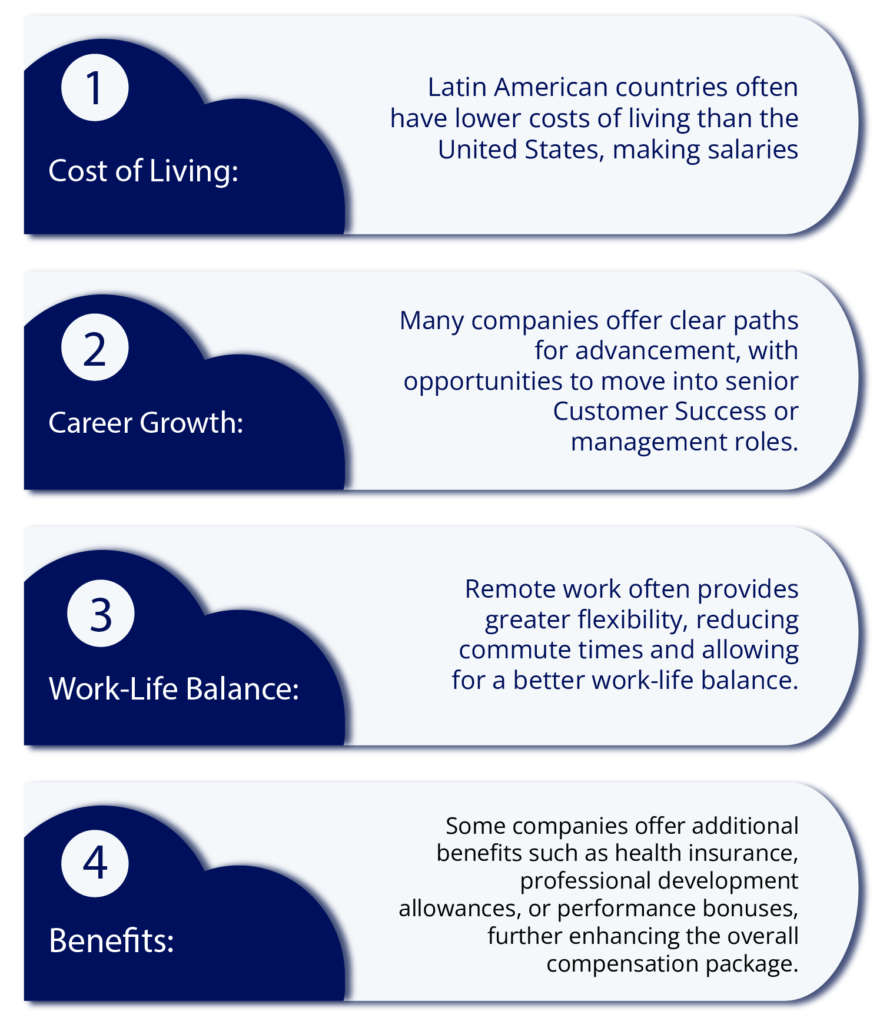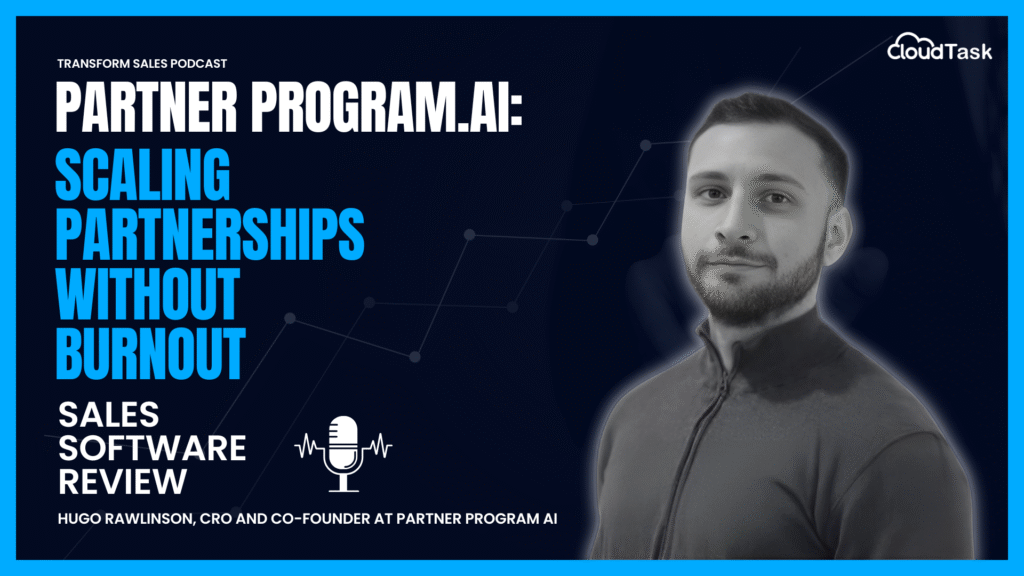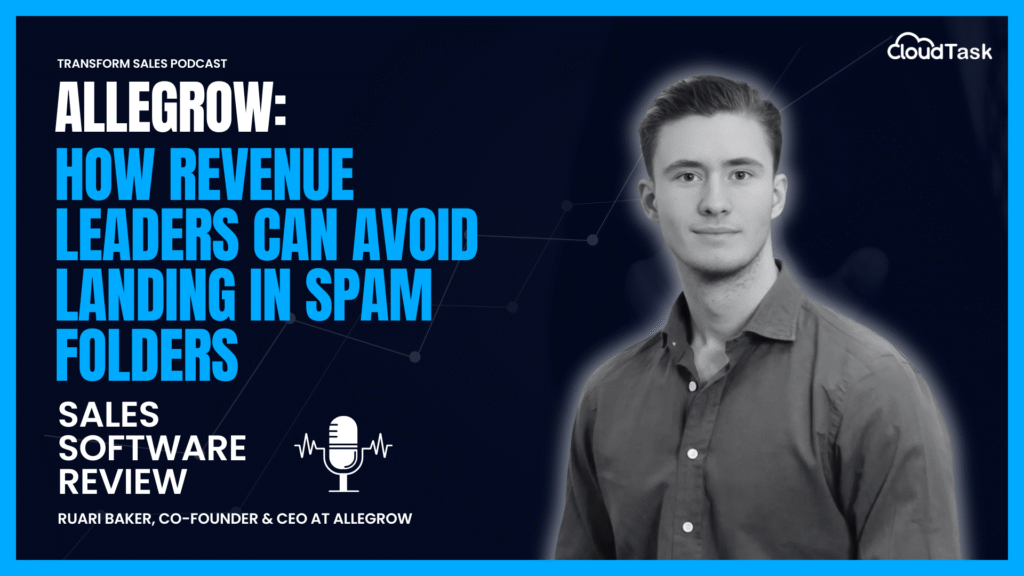Are you struggling to keep your customers satisfied and loyal to your brand?
63% of companies report that poor customer service leads to customer churn, costing businesses millions annually. In fact, for every customer lost due to poor service, companies see a revenue decline of up to 30%
Companies want to keep their customers happy and coming back for more. That’s why a Customer Success Rep has become essential for maintaining strong client relationships and driving business growth.
With the ability to manage customer relationships efficiently from anywhere, these professionals ensure customer satisfaction and retention, ultimately boosting company revenue.
This blog explores the critical skills, roles, and salary expectations for hiring a Customer Success Rep from Latin America to help your business thrive.
The Growing Demand for Remote Customer Success Representatives
Remote work has transformed the customer success industry, creating new opportunities for CSRs worldwide.
More companies are building remote customer success teams, seeing the benefits of accessing global talent.
Companies want remote Customer Success Representatives for several good reasons:

The customer success industry is booming. Recent statistics show:
- The CSP market is growing at a Compound Annual Growth Rate of 21.7%.
Essential Skills of a Top-Performing Customer Success Representative
A high-performing Customer Success Representative needs a blend of interpersonal skills, product knowledge, and a customer-first mindset.
Successful CSRs ensure that customers are satisfied with the products or services they’ve purchased while also identifying opportunities for upselling or cross-selling.
Here are the essential skills to look for when hiring a CSR:
- Effective Communication: They must clearly explain product features, benefits, and solutions across various channels, including email, phone, and video calls.
- Active Listening: Understanding customer needs is crucial. They need to listen carefully to spot problems, challenges, and opportunities to add value.
- Empathy: Their ability to understand and share the feelings of your customers is essential for building strong relationships.
- Problem-Solving: They’ll need to quickly identify and resolve issues that customers face, often working with other teams to find solutions.
- Product Knowledge: Knowing your company’s products or services inside out helps you guide customers effectively and suggest the best solutions.
- Time Management: You’ll be juggling multiple customer accounts and tasks, so good time management and prioritization are essential.
- Adaptability: Customer needs and product offerings change. Successful CSRs stay flexible, quickly adapting to new technologies, strategies, and market trends.
- Data Analysis: Understanding and interpreting customer data helps you make informed decisions and provide personalized support.
- Proactivity: Anticipating customer needs and potential issues before they arise is a key skill for CSRs.
- Strategic Thinking: Top CSRs develop and follow plans to improve customer satisfaction, retention, and account growth.
Salary Expectations for Remote Customer Success Representatives
Understanding salary expectations is important if you’re thinking about becoming a Customer Success Representative or if you are a company looking to hire one.
How much a remote CSR makes can depend on their experience, the industry they work in, and the size and location of the company hiring them.
According to the CloudTask 2024 Salary Guide, here are the realistic salary ranges of a remote Customer Success Representative in Latin America:
- LATAM-based Annual Salary Range: $12,000 to $18,000 USD.
It’s important to note that these figures represent base salaries. Many Customer Success Representative roles also include performance-based bonuses or commissions, which can significantly increase total compensation.
Several factors make these salary ranges attractive for both employers and employees:

Key Responsibilities of a Customer Success Representative
Customer Success Representatives are responsible for ensuring that customers achieve their desired outcomes with the product or service they’ve purchased.
Their role is vital in maintaining long-term customer relationships and driving account growth.
Here are the primary responsibilities of a CSR:
- Customer Onboarding: Guide new clients through the process of getting started with the product or service, ensuring a smooth and positive initial experience.
- Product Training: Provide training and demonstrations to customers, helping them understand how to use and get the most out of the product or service.
- Relationship Management: Serve as the main point of contact for customers post-sale, regularly checking in and building strong relationships.
- Issue Resolution: Work to resolve any product or service issues that customers encounter, often liaising with the product and support teams to address these issues quickly and effectively.
- Customer Retention: Keep customers satisfied with the product or service to maintain a high retention rate and reduce churn.
- Upselling and Cross-selling: Identify opportunities to sell more to existing customers, helping them discover additional features or services that could benefit their business.
- Feedback Loop: Gather customer feedback and communicate it back to your team, helping to improve the product or service based on user experiences.
- Account Growth: Work towards growing the value of customer accounts, typically through increasing product usage or selling additional services.
- Advocacy: Help turn satisfied customers into advocates for the company, which may involve coordinating testimonials, case studies, or referrals.
- Proactive Support: Anticipate customer needs and potential issues before they arise, reaching out to customers with solutions and best practices.
Best Practices for Hiring Customer Success Representatives
Finding the right CSR requires a strategic approach, one that focuses not only on skills but also on cultural fit and adaptability.
A well-chosen CSR can be a powerful asset, proactively addressing customer needs and reducing churn, while also identifying opportunities for growth.
Here are the best practices to follow when hiring a Customer Success Representative:
- Focus on Predictive Assessments: Use data-driven tools to gauge candidates’ strengths in key areas like empathy, problem-solving, and time management. Predictive assessments can give insight into a candidate’s “Talent DNA,” helping you determine if they’re better suited for customer success roles rather than other positions.
- Leverage Customer Feedback and Data: Analyze feedback from your existing customers to identify the traits of your most successful team members. Look at churn rates, customer satisfaction scores, and previous onboarding successes to guide your hiring criteria.
- Evaluate Problem-Solving Under Pressure: Effective CSRs need to handle complex issues calmly. Incorporate role-playing exercises in the interview process where candidates must solve real-world customer problems. This will give you a practical sense of how they perform under pressure.
- Prioritize Cultural Fit Alongside Skills: While technical abilities and customer success experience are important, a CSR’s alignment with your company culture plays a huge role in long-term success. Consider implementing a 30/30/30/10 hiring model, where 30% of the decision is based on cultural fit.
- Incorporate Mock QBR (Quarterly Business Review) Sessions: Customer Success Representatives often need to manage and present QBRs to clients, which are critical for renewing contracts and identifying growth opportunities. A great way to assess candidates’ skills is to have them prepare and deliver a mock QBR during the interview process. This shows how they handle client conversations and if they can upsell effectively in real scenarios.
Final Thoughts
Hiring a Customer Success Representative can significantly impact your customer retention and business growth.
Whether you’re focused on improving customer satisfaction or driving account expansion, remote CSRs offer the skills and flexibility to meet your business goals.
The LATAM market is an excellent resource for cost-effective, skilled talent, providing opportunities for growth and reinvestment in other areas of your business.
If you’re ready to hire, browse the CloudTask Marketplace for top Customer Success Representative candidates. You’ll find detailed profiles and video introductions to help you make informed decisions.
Check out our YouTube playlist featuring profiles of experienced CSRs. See how they’ve thrived in their roles, and start building your high-performing team today.
And if you need personalized assistance, book a meeting with a CloudTask Specialist to explore tailored hiring options for your business.
Frequently Asked Questions (FAQs)
How do I measure the effectiveness of a remote Customer Success Representative?
- Use KPIs such as customer retention rate, customer satisfaction (CSAT) score, and churn rate to measure effectiveness. These metrics provide insights into how well the CSR is maintaining relationships and solving customer issues.
How do I successfully onboard a remote Customer Success Representative?
- Begin with an overview of your company’s products, services, and customer success protocols. Provide access to necessary tools and systems and set initial goals and KPIs. Regular check-ins during the first few months can help ensure they integrate smoothly into your team.
How do I measure the ROI of hiring a remote CSR?
- Measuring ROI involves tracking customer retention rates, upsell/cross-sell success, customer satisfaction scores (CSAT), and Net Promoter Scores (NPS). A well-performing CSR should help reduce churn, increase customer lifetime value, and contribute directly to revenue growth by identifying new sales opportunities.








